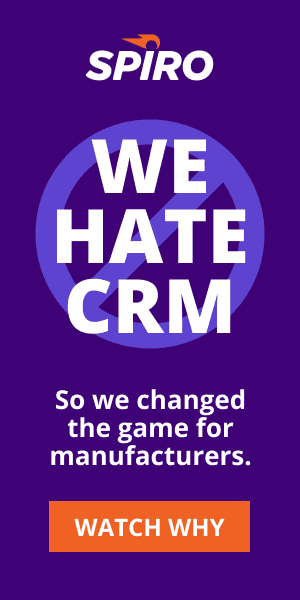Why You Don’t Need to Fix Your ERP Data to Benefit from CRM

There are a lot of reasons why it might not feel like the right time to take on a major cross-departmental project such as implementing a new CRM. Chief among them is the common misconception that manufacturers and distributors need to have their ERP in perfect order before implementing a CRM.
The reality, though, is that no ERP data will ever be perfect, and most manufacturers don’t have the time (or resources) to invest in a years-long effort to achieve that. Nor should they. Here are some common myths about less-than-perfect ERP data slowing down modernizing your CRM platform:
- “If my ERP data is a mess, my CRM data will be a mess too.”
- “We have some good data in our ERP, but we want to clean up the rest first.”
- “We are implementing a new ERP. We want to finish that first.”
- “It won’t help our sales team if the data isn’t accurate or up to date.”
These may sound like valid reasons to postpone acquiring a CRM for the first time or replacing one, but in most cases putting off finding the right CRM solution for your business does more harm than good. Regardless of the circumstances surrounding your ERP data, CRMs such as Spiro can provide immense value right away. Putting off the issue for a perfect moment that will never arrive prevents your business from reaping the benefits of CRM, often when they are most urgently needed.
Spiro is an AI-driven CRM built with manufacturers in mind. ERPs are at the heart of business operations in the manufacturing industry. As a result, Spiro is built to have flexibility when it comes to managing ERP data. What this means for businesses looking to adopt a new CRM solution that are concerned about the state of their ERP is that they can implement Spiro without disrupting other ongoing business projects such as data cleansing or ERP updates.
Spiro offers this flexibility by giving users a variety of options when it comes to how to import their ERP data. A one way integration is recommended for a variety of reasons, one of which being it eliminates the possibility of Spiro getting in the way of changes made in an ERP or other business apps. Some of the options available to manage ERP data in Spiro include:
- Import all ERP Data in Spiro Regardless of Accuracy – With a one way integration, as the data is updated in the ERP, it will be updated in Spiro, resulting in consistent data across all business apps.
- Import Only Accurate Data into Spiro – If you are in the middle of an ERP cleanup, this can be a good option. Once records are updated or cleaned, they can be sent into Spiro. Once the cleanup is complete and all data is sent over to Spiro, the end result is consistent data across all business apps.
- Connect More than One ERP – If you are in the middle of transitioning from one ERP to another, Spiro makes this transition painless and can collect data from one or both as needed to make sure sales can benefit from the best data available.
It is a common misconception in manufacturing that sales teams will best benefit from a CRM once a reliable ERP setup is in place. Sales teams benefit from a CRM like Spiro right away. While perfect data is better than imperfect data, perfect is the enemy of good and some data is better than none. Until a company implements CRM, their sales team may be flying totally blind. Given the flexibility Spiro offers manufacturers and distributors in dealing with ERP data, it is better to accept good and work slowly towards perfection rather than sit on nothing and wait for a moment that will never come.
When is the Right Time to Implement Spiro?
There will always be reasons why it won’t feel like the ideal time to take on a complicated and daunting task such as implementing CRM. But it is always a good enough time if your team will benefit. In addition to offering built-in flexibility regarding ERP data, Spiro offers new customers a full-service setup with a Spiro representative to ensure a smooth and efficient implementation. While it has become the expectation that tackling CRM be a costly, lengthy, and cumbersome process, Spiro offers manufacturers a new, more streamlined approach.

